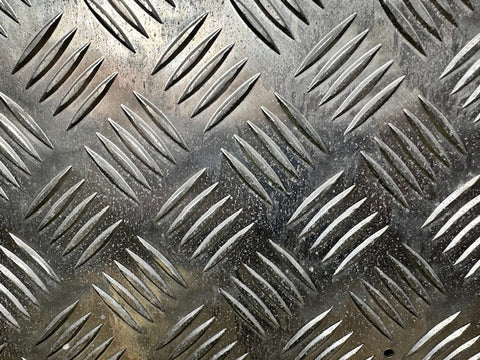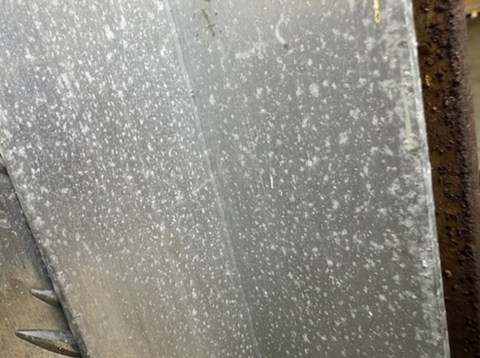Aluminium is a versatile and commonly used material in various industries, but there seems to be a lingering misconception that it rusts. Read on, as we uncover the truth behind this myth and explore the real reasons why aluminium does not rust.
What is rust and how does it form?
Rust is a common term used to describe the corrosion or oxidation of metals, particularly iron and its alloys. It is characterised by the formation of a reddish-brown coating on the surface of metal objects, which can weaken and eventually destroy their structural integrity if left untreated.
The process of rusting involves a chemical reaction between iron, oxygen, and water. This reaction is known as oxidation and occurs when metal comes into contact with moisture in the air or water. The presence of salt in the environment can also accelerate this process.
Can Aluminium rust?
Aluminium is a widely used metal in various industries due to its lightweight, durability, and corrosion resistance properties. However, there is a common misconception that aluminium can rust. This belief might stem from the fact that other metals such as iron and steel are prone to rusting, especially when exposed to moisture and oxygen. But does aluminium really rust?
The simple answer is no. Aluminium does not rust in the traditional sense like iron and steel do. Rust is a reddish-brown coating that forms on iron or steel when it undergoes oxidation in the presence of water or moisture. It is a form of corrosion that weakens the metal's structural integrity and leads to its eventual breakdown.
On the other hand, aluminium has a natural oxide layer on its surface that protects it from corrosion. When exposed to air, aluminium reacts with oxygen molecules to form this thin layer of aluminium oxide (Al2O3) which acts as a barrier against further oxidation. This process is known as passivation and is what gives aluminium its excellent corrosion resistance properties.
However, under certain conditions, aluminium can corrode but not in the same way as iron or steel do. The main cause of corrosion in aluminium is through galvanic corrosion or electrolysis. Galvanic corrosion occurs when two dissimilar metals come into contact while immersed in an electrolyte solution such as saltwater or acidic environments.
In this scenario, the more reactive metal (aluminium) will act as an anode while the less reactive metal (such as stainless steel) will act as a cathode. The electrons flow from the anode (aluminium) towards the cathode (stainless steel), causing the former to lose electrons and eventually deteriorate over time.
Furthermore, if there are any scratches or damages on the protective oxide layer of aluminium, it can also lead to localised pitting corrosion where small pits form on the surface of the metal due to exposure to corrosive agents.
While aluminium does not rust like iron or steel, it can corrode under specific conditions. However, with proper maintenance and care, the natural oxide layer on its surface provides excellent protection against corrosion. Therefore, it is safe to say that aluminium's resistance to rusting is one of its significant advantages and makes it a preferred choice in many applications.
The role of corrosion in Aluminium
The role of corrosion in Aluminium is a crucial aspect to understand when discussing the myth of whether aluminium rusts or not. While it may seem contradictory, aluminium can indeed corrode, albeit in a different way than iron and other metals.
Corrosion is a natural process that occurs when metals react with their environment, leading to their deterioration over time. In the case of aluminium, this reaction takes place through a process called oxidation. When exposed to oxygen, aluminium forms a thin layer of oxide on its surface, which acts as a protective barrier against further corrosion. This layer is stable and prevents any deeper penetration by oxygen molecules.
However, if this protective layer is damaged or compromised in any way, then corrosion can occur. This can happen due to various factors such as exposure to harsh chemicals, high humidity levels, or contact with dissimilar metals. In these cases, the protective layer breaks down, leaving the underlying metal vulnerable to further oxidation.
One common form of corrosion that affects aluminium is known as pitting corrosion. This type of corrosion occurs when small pits or holes start forming on the surface of the metal due to localised breakdown of the oxide layer. Pitting corrosion can be caused by chloride ions found in saltwater or acidic environments and can lead to significant damage if left untreated.
Another form of corrosion that affects aluminium is galvanic corrosion. This occurs when two different metals come into contact with each other while being exposed to an electrolyte (such as water). The more reactive metal (in this case aluminium) will experience accelerated corrosion compared to the less reactive one. Galvanic corrosion often happens in industrial settings where dissimilar metals are used together but can also occur at home if improper materials are used for repairs.
It's essential to note that while aluminium does have some resistance against corrosion due to its oxide layer and low reactivity with most substances; it is not entirely immune from it. Therefore, proper care and maintenance are crucial to prevent corrosion and ensure the longevity of aluminium products.
While aluminium does not rust in the traditional sense like iron, it can corrode due to factors such as exposure to harsh environments or contact with dissimilar metals.
How to prevent Aluminium Corrosion: tips and tricks
Preventing corrosion on aluminium is essential to maintaining its appearance and structural integrity.
Keep it clean:One of the most important ways to prevent corrosion on aluminium is by keeping it clean. Dirt, grime, and other contaminants can create a barrier between the surface of the metal and the protective oxide layer that naturally forms on aluminium. This barrier can trap moisture and corrosive substances, leading to corrosion. Regularly cleaning your aluminium surfaces with mild soap and water can help remove any build-up and keep them free from potential corrosive agents.
Avoid harsh chemicals:While cleaning your aluminium surfaces, avoid using harsh chemicals such as bleach or ammonia-based cleaners. These chemicals can strip away the protective oxide layer on the metal, leaving it vulnerable to corrosion. Instead, opt for gentle cleaners specifically designed for use on metals.
Apply a protective coating:Applying a protective coating to your aluminium surfaces is an effective way of preventing corrosion. There are various types of coatings available in the market, such as paint or clear sealants specifically made for use on metals like aluminium. These coatings act as a barrier between the metal surface and external elements that may cause corrosion.
Use anodising:
Anodising is another method of creating a protective layer on aluminium surfaces by treating them with an electrical current in an acidic solution. This process creates a thick oxidised layer that not only protects against corrosion but also enhances the appearance of the metal.
Use galvanic protection:
Aluminium can be protected from corrosion by using galvanic protection methods such as sacrificial anodes or cathodic protection systems. Sacrificial anodes are made from more reactive metals than aluminium (such as zinc) and are connected to the aluminium surface. These anodes corrode instead of the aluminium, protecting it from corrosion. Cathodic protection systems work by applying a negative electrical current to the metal, which prevents corrosion from occurring.
While aluminium does not rust in the traditional sense, it can corrode over time if not properly protected. By following these tips and tricks for preventing corrosion on aluminium, you can ensure that your surfaces remain in good condition for years to come. Remember to keep them clean, avoid harsh chemicals, apply protective coatings or anodising where appropriate and consider using galvanic protection methods for added protection. With proper care and maintenance, your aluminium surfaces will stay looking new and corrosion-free.
Conclusion: debunking the myth that Aluminium rusts
The idea of aluminium rusting is a complete myth. Despite its appearance and properties being like rust, aluminium does not actually corrode in the same way as iron or steel. This misconception has been perpetuated for years, leading many people to believe that aluminium will eventually rust like other metals, but this is simply not true!













